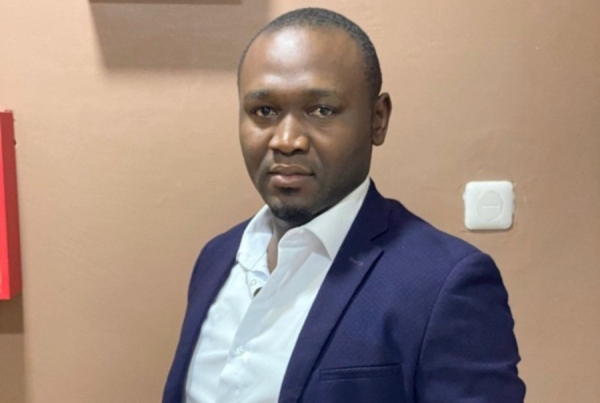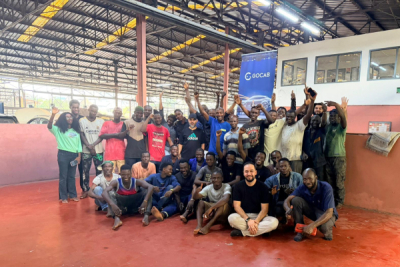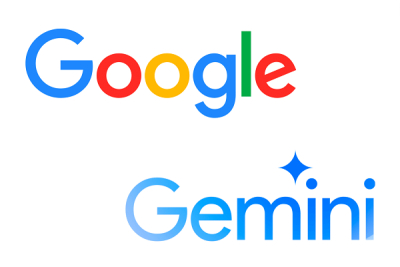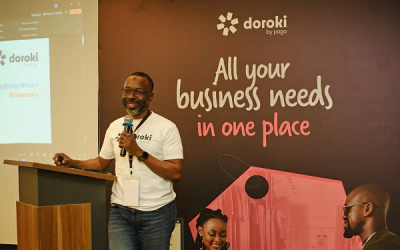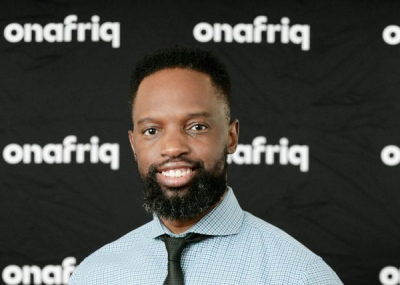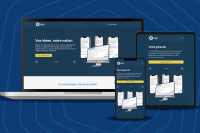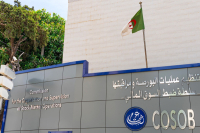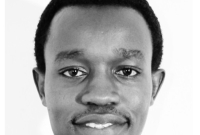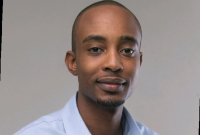-
Signe Fokui Maxime founded and leads Bitkap, a multifunction digital wallet that supports FCFA and U.S. dollar transactions.
-
Launched in 2020, Bitkap enables free international transfers, instant currency conversion and online payments.
-
The platform targets financial inclusion by reducing costs and complexity in cross-border and domestic payments.
Signe Fokui Maxime is a Cameroonian software developer and technology entrepreneur. He founded and currently serves as chief executive officer of Bitkap, a multifunction application that operates as a digital wallet, money transfer service and online payment solution.
Launched in 2020, Bitkap allows users to deposit, store, send and withdraw money in CFA francs and U.S. dollars. The application focuses on simplifying everyday transactions by offering a fast and seamless experience completed in just a few clicks.
Users can fund their accounts in FCFA or USD and transfer funds using a username known as a cashTag or a QR code. The system allows users to avoid sharing bank details or mobile money numbers. Bitkap offers free international transfers, which eliminates fees that often increase the cost of cross-border remittances.
Bitkap also differentiates itself through instant currency conversion. Users can deposit funds in one currency and withdraw them in another without using traditional foreign exchange services and their often unfavorable rates. The application displays real-time exchange rate movements between the CFA franc (XAF) and the U.S. dollar (USD), which enables users to choose optimal conversion timing. The platform completes peer-to-peer transfers in four simple steps and provides continuous transaction tracking.
In addition, Bitkap allows users to generate instant virtual Visa cards for online payments on platforms such as Facebook, Amazon, Netflix, PayPal and betting websites. The application also enables immediate mobile airtime purchases in FCFA or USD for all mobile operators operating in Cameroon.
Signe Fokui Maxime earned a university diploma in mathematics in 2016 from the University of Douala. He obtained a bachelor’s degree in software engineering in 2019 from the University of Dschang. He later continued his studies in France at the École Supérieure des Technologies de l’Information Appliquées aux Métiers, where he earned a master’s degree in artificial intelligence in 2024.
He began his professional career in 2016 at Cameroonian fintech Ring Corporation as a developer. In 2019, he joined IT company ACESY as lead software development engineer. He later moved to French technology firm Dembou Consulting, where he worked as a Java developer until 2020.
This article was initially published in French by Melchior Koba
Adapted in English by Ange J.A de BERRY QUENUM
-
Audrey Ludivine Baha co-founded and leads Nofey, a digital platform that connects individuals with vetted local artisans across Africa.
-
Founded in 2025, Nofey enables service booking, reviews and Mobile Money payments to build trust in informal service markets.
-
Baha combines an engineering background with advanced entrepreneurial training at HEC Paris.
Audrey Ludivine Baha is a Cameroonian agro-industry engineer and entrepreneur. She co-founded and currently serves as chief executive officer of Nofey, a startup that helps individuals easily find reliable artisans and technicians across Africa.
Founded in 2025, Nofey operates a mobile application that connects households with artisans, technicians and other professionals who meet everyday needs. The company focuses on building trust between service seekers and service providers in markets that remain largely informal.
For individuals, the platform enables fast access to nearby, vetted artisans. Users can search for services such as plumbing, electrical work, hairdressing, mechanics, carpentry, painting, air conditioning, locksmithing, gardening and masonry, among others. Each professional maintains a profile that includes ratings, customer reviews and practical information to assess reliability. The platform processes payments through Mobile Money, which ensures secure transactions adapted to local usage patterns.
Nofey also provides artisans and technicians with tools to showcase their skills and expand their customer base. Service providers can create professional profiles, receive client requests, manage bookings and receive prompt payments through the platform. A dedicated provider application offers activity management tools designed to increase job opportunities and strengthen professional credibility.
The company designed the user experience to remain simple and intuitive. Users search for a service, review professional profiles, communicate through in-app messaging, then book and pay directly within the application. The process enables users to secure a service provider within minutes.
Baha earned an engineering degree in agro-industry in 2025 from UniLaSalle in France. She is currently completing a master’s degree in entrepreneurial studies at HEC Paris. She began her professional career in 2021 as an assistant engineering intern at Les Chocolateries Artisanales Nohi in Cameroon.
After completing a production internship at French agrifood company Cycloponics, she worked as a freelance translator in 2023. In 2024, she joined French natural beverage brand Necence as a research and development assistant. The company promoted her three months later to project manager in R&D and sourcing.
This article was initially published in French by Melchior Koba
Adapted in English by Ange J.A de BERRY QUENUM
-
GoCab raised $45 million in equity and debt to expand electric and inclusive mobility solutions in Africa.
-
The funding round combined $15 million in equity and $30 million in debt led by E3 Capital and Janngo Capital.
-
GoCab reported more than $17 million in annual recurring revenue across five African markets after 18 months of operations.
In a statement released on Tuesday, February 3, mobility and vehicle financing fintech GoCab announced the closing of a $45 million funding round. The transaction included $15 million in equity and $30 million in debt and aimed to accelerate the rollout of electric and inclusive mobility solutions across multiple African markets.
E3 Capital and Janngo Capital led the funding round alongside KawiSafi Ventures and Cur8 Capital. The company said it would use the funds to strengthen operations in existing markets, enter new high-growth cities and increase the share of electric vehicles in its fleet. GoCab also plans to deploy artificial intelligence-based tools for credit scoring, fleet optimization and risk management.
“In Africa, millions of people remain excluded from both mobility and financing. This funding round allows us to scale while expanding access to ethical financing and accelerating the transition to electric mobility,” said Azamat Sultan, co-founder and executive chairman of GoCab.
Azamat Sultan and Hendrick Ketchemen founded GoCab in 2024 after careers in investment banking focused on structured finance and emerging markets. The company set out to address limited access to financing and vehicle ownership for platform economy workers. GoCab offers a model that allows drivers and delivery workers to generate stable income while gradually acquiring ownership of their vehicles.
After 18 months of operations, GoCab operates in five African markets and reports more than $17 million in annual recurring revenue. The company employs more than 120 people representing 18 nationalities. GoCab supports several thousand drivers and aims to help structure more sustainable urban mobility systems.
As Africa’s platform workforce continues to grow while remaining largely excluded from traditional financial systems, GoCab aims to position itself as a key player in sustainable mobility. Over the medium term, the company targets the deployment of 10,000 operational vehicles and $100 million in annual recurring revenue by combining ethical financing, technology and energy transition.
This article was initially published in French by Samira Njoya
Adapted in English by Ange J.A de BERRY QUENUM
Google is testing a new Gemini feature called Import AI Chats, which would let users transfer their chat histories from rival assistants such as ChatGPT, Claude and Grok. By carrying over context and user preferences, the tool aims to reduce switching costs. Still in beta, the feature could add momentum to broader efforts across the industry to improve data portability and interoperability.
Paga, via its Doroki merchant platform, has formed a strategic partnership with Nigeria’s Leadway Assurance to provide tailored insurance solutions for retailers. The current rollout includes coverage for cash-in-transit, fire and theft, and Point-of-Sale (POS) terminal protection. Soon, the partnership will expand to offer credit life insurance for Memento loans. Beyond coverage, the initiative focuses on building merchant resilience through risk awareness and education.
Onafriq Nigeria Payments Limited has partnered with the Pan-African Payment and Settlement System (PAPSS) to launch a pilot of the first cross-border wallet payment service between Nigeria and Ghana. The six-month trial, approved by the Central Bank of Nigeria, allows payments to be made in naira and settled in real time, using the partners’ banking and mobile money networks. The service is aimed at consumers, merchants and small businesses.
- DR Congo’s Fogec launches Bokeli, a digital platform to streamline business plan development and financing applications for SMEs and startups.
- The platform standardizes information for financial institutions and reduces administrative barriers to credit approval.
- Over five years, Fogec has supported nearly 300 projects, totaling $3.2 million, while Congolese startups raised $2 million in 2024, highlighting the financing gap.
The Entrepreneurship Guarantee Fund in Congo (Fogec) launched a digital platform, Bokeli, on February 3 in Kinshasa to help entrepreneurs structure business plans and submit financing applications electronically. The platform is part of DR Congo’s broader effort to strengthen SME and startup access to credit.
Entrepreneurs can access Bokeli at https://bokeli.fogec.cd/ to create business plans, prepare financial documentation, and transmit their applications to relevant institutions. The system aims to standardize the data required by banks and guarantee mechanisms, while reducing administrative hurdles that slow financing approvals.
Fogec said the initiative addresses a key challenge in the Congolese entrepreneurial ecosystem: many project owners struggle to produce technically sound applications that meet banks’ requirements. “Our mission is to facilitate access to financing for SMEs, startups, and artisans by providing guarantees to viable projects,” the institution said.
The launch comes amid a growing entrepreneurial environment, driven by a young population increasingly engaged in economic activities. Despite this dynamism, access to structured financing remains limited. According to Partech Africa, Congolese startups raised $2 million in 2024, up from $1 million in 2023, still modest relative to market potential.
Fogec said it has supported nearly 300 projects totaling $3.2 million over five years. By offering a digital tool for business planning and application submission, the institution seeks to improve project bankability and facilitate interactions between entrepreneurs, guarantee structures, and financial institutions, boosting national productive capacity.
Samira Njoya
- Algeria exempts certified startups from IPO and listing fees on the Algiers Stock Exchange until 2028, targeting fundraising up to 500 million dinars ($3.85 million).
- The measure applies to the “Croissance” segment, designed for high-potential companies, and aims to reduce barriers to capital market access for startups.
- Only one Algerian startup, Moustachir, has listed to date, achieving regional expansion and projected revenue growth to 187 million dinars by 2028.
Algeria’s capital market authorities aim to stimulate startup financing by waiving IPO fees for certified startups until 2028. The measure, announced February 1 by the Commission d’Organisation et de Surveillance des Opérations de Bourse (COSOB) in coordination with the Société de Gestion de la Bourse des Valeurs (SGBV) and Algérie Clearing, allows young companies to raise funds without paying listing or administrative costs.
The exemption covers the “Croissance” segment of the Algiers Stock Exchange, a market tier for high-potential companies. Eligible startups avoid fees for document review, listing, administration, securities custody, and management. The initiative applies to fundraising operations capped at 500 million dinars ($3.85 million) and is valid for transactions conducted between 2026 and 2028.
Algeria hosts over 7,800 startups on the official portal startup.dz, with roughly 2,300 certified as official “startups.” Authorities view the fee waiver as a key lever to enhance access to capital markets, a historically limited source of funding for young companies.
The policy complements broader public strategies to support entrepreneurship and innovation as drivers of economic diversification. The Algiers Stock Exchange remains small, listing only eight companies as of mid-2025, including the Banque de Développement Local (BDL) and the startup Moustachir.
Moustachir, the only startup to have listed so far, joined the exchange in 2024. The company projected revenue above 55 million dinars in 2025, with a target exceeding 187 million dinars by 2028. Within two years, it has expanded into Middle Eastern markets, including Oman and the United Arab Emirates.
Samira Njoya
- Kenyan tech entrepreneur Timothy Ndung’u’s company, Geviton, develops IoT-based hardware solutions to monitor and optimize industrial equipment operations.
- Geviton solutions enable remote monitoring, energy management, and real-time tracking of technical and environmental parameters, reducing downtime and operational costs.
- Founded in 2018, Geviton supports multiple sectors while promoting environmentally responsible practices and data-driven decision-making.
Kenyan electronics engineer and entrepreneur Timothy Ndung’u is transforming how organizations track and manage industrial equipment through the Internet of Things (IoT). He co-founded Geviton in 2018 with Felix Omwansa and Rose Kubai, aiming to shape the future with hardware solutions that optimize operations and sustainability.
Geviton designs durable hardware solutions that improve data utilization across industries. The company helps organizations enhance operational efficiency while promoting environmentally responsible practices. Ndung’u’s approach positions data as a lever for performance and strategic decision-making.
Geviton provides solutions that connect equipment, deliver real-time operational insights, and support informed decision-making. The company highlights several key applications:
- Remote monitoring and control: Clients access real-time industrial equipment data, reducing downtime and operational disruptions.
- Energy management: Organizations track energy usage, optimize consumption, cut costs, and reduce environmental impact.
- Environmental and technical tracking: Wireless sensor networks allow organizations to monitor environmental and operational parameters. The systems are scalable, easy to deploy, and require minimal maintenance.
Ndung’u earned a bachelor’s degree in electrical and electronic engineering from the Technical University of Kenya in 2014. He began his career the same year as a product design engineer at Evolva Solutions, a Kenyan technology firm. In 2016, he joined Avery East Africa as an electrical design and automation consultant, focusing on scales manufacturing, maintenance, and repair. From 2018 to 2022, he served as head of hardware engineering at Megadodo Simulation Games, a virtual reality multiplayer gaming company.
Melchior Koba
- Suleiman Murunga founded Muda in 2021, a global payments platform that supports individuals and businesses in over 50 countries.
- Muda offers regulatory compliance, currency conversion, and end-to-end fund delivery, including digital and fiat currencies.
- Murunga also leads Murcom, sits on the Blockchain Association of Uganda board, and previously founded fintechs M-Duka and Coinpesa.
Ugandan entrepreneur Suleiman Murunga founded Muda in 2021 and serves as its chief executive officer. The platform enables users to send and receive payments globally through a single interface. Muda manages regulatory compliance, currency conversion, and delivery of funds to final beneficiaries. It provides access to money in over 50 countries, supporting both fiat and digital currencies.
Muda positions itself as a comprehensive platform catering to both corporate and individual users. Businesses can process supplier payments and cross-border transactions, while individuals can use the platform for rapid transfers and remittance services. Muda aims to ensure a seamless experience for all users through a shared technological base and harmonized services.
The platform allows businesses to obtain dedicated accounts, including IBANs or local accounts, by client or payment corridor. This feature simplifies tracking and reconciliation of financial flows. Muda also offers digital wallets for multiple assets—including USDC, USDT, and cNGN—complete with internal rules, audit trails, and multi-network compatibility.
Murunga also serves as CEO of Murcom, a software development company that manages blockchain initiatives. He sits on the board of the Blockchain Association of Uganda, an organization connecting professionals, experts, and enthusiasts in the sector. Murunga previously founded M-Duka, a fintech operating from 2012 to 2015, and served as CEO of Coinpesa from 2017 to 2021, a cryptocurrency exchange aimed at broadening access to digital assets.
Murunga holds a bachelor’s degree in marketing management from Coventry University in the UK (2010). In 2015, he became CEO of Pegasus Technologies, a fintech company.
This article was initially published in French by Melchior Koba
Adapted in English by Ange J.A de BERRY QUENUM
More...
- SABC and Microsoft South Africa launched a program on SABC Plus to provide digital and AI skills training to South Africans.
- Microsoft has already trained 1.4 million people and certified nearly 500,000 citizens under its Microsoft Elevate and AI Skills Initiative programs.
- The initiative targets growing labor market demand, with an estimated 230 million jobs in sub-Saharan Africa requiring digital skills by 2030.
South Africa’s public broadcaster, South African Broadcasting Corporation (SABC), partnered with Microsoft South Africa to provide citizens with training in digital skills and artificial intelligence (AI). The program delivers content via SABC Plus, a free streaming platform with 1.9 million registered users.
Tiara Pathon, Microsoft Elevate AI Skills director in South Africa, said, “AI can be a powerful driver of opportunity. By partnering with SABC, we aim to integrate digital and AI skills into the daily lives of millions of South Africans. This initiative provides learners, teachers, and job seekers with practical, certified pathways that prepare them for the workforce of tomorrow. Democratizing AI skills is not just a goal; it is our responsibility to build a more inclusive digital economy.”
The initiative forms part of Microsoft Elevate, which equips individuals and organizations with the tools to thrive in an AI-driven economy. It builds on the AI Skills Initiative launched in 2025, which committed to training one million South Africans by 2026. To date, Microsoft reports reaching four million learners, training 1.4 million, and issuing certifications to nearly 500,000 citizens.
The program responds to strong labor market demand for digital skills. The World Bank estimates 230 million jobs in sub-Saharan Africa will require digital competencies by 2030. The World Economic Forum’s 2025 Future of Jobs Report ranks AI and data skills among the most in-demand by 2030. LinkedIn reports a 25% year-on-year increase in AI-related hires, with job postings requiring AI skills up 70%, extending beyond technical roles.
According to Microsoft’s AI Diffusion Report, AI adoption in South Africa rose from 19.3% in the first half of 2025 to 21.1% in the second half, a 1.8-point increase. Recruitment platform Pnet notes AI-related job demand in the country grew 352% between January 2019 and July 2025.
Despite the program’s potential, effectiveness remains a concern. Only 25% of SABC Plus’s 1.9 million registered users are active, limiting the initiative’s reach. Free access requires an internet connection, which remains uneven across rural or low-income communities. Citizens lacking digital devices also remain excluded from the training.
This article was initially published in French by Isaac K. Kassouwi
Adapted in English by Ange J.A de BERRY QUENUM
- Algerian healthtech DZDOC digitises medical appointments, consultations, and patient–doctor interactions.
- Founder Rachid Maou launched the Annaba-based platform in 2015.
- DZDOC offers online booking, secure teleconsultation, and digital practice management tools.
DZDOC operates as a multi-service e-health platform developed by an Algerian startup. The company simplifies access to healthcare by digitising appointment booking, medical consultations, and interactions between patients and healthcare professionals. Founder Rachid Maou launched the platform in Annaba in 2015.
The platform allows patients to search for and book medical appointments online with practitioners across a wide range of specialties, including general medicine, surgery, psychiatry, and nutrition. Users can conduct searches by specialty and geographic location, which facilitates connections with nearby and available professionals.
DZDOC also integrates a secure teleconsultation system that enables users to consult doctors remotely through video calls. The service covers both physical and mental health and provides access to a broad network of practitioners without requiring physical travel. This feature offers clear advantages for remote populations and users with limited mobility.
For healthcare professionals, the platform provides a digital practice management interface with tools such as schedule planning, automated SMS and email reminders, and enhanced online visibility to patients. The solution aims to optimise appointment flow and improve practitioners’ operational efficiency.
DZDOC illustrates how digital health technologies can address healthcare accessibility challenges by connecting medical supply and demand in a market that remains largely dependent on in-person interactions.
This article was initially published in French by Adoni Conrad Quenum
Adapted in English by Ange J.A de BERRY QUENUM
- Moroccan proptech startup Yakeey raised $15 million to support growth and expansion.
- Founder Karim Beqqali launched the Casablanca-based platform in 2022.
- Yakeey positions itself as a one-stop digital platform for buying, selling, renting, and valuing property.
Yakeey operates as a Moroccan digital platform dedicated to real estate transactions. The company aims to transform a traditionally fragmented property market into an integrated, fluid, and transparent ecosystem. Founder Karim Beqqali launched the Casablanca-based startup in 2022.
The platform combines an intuitive digital interface with human support delivered by specialized advisers. This hybrid approach allows users, including sellers, buyers, tenants, and investors, to manage their entire real estate project from a single online platform. At the same time, advisers provide personalized guidance at each stage of the process.
Yakeey also adds value by connecting all market participants, including property owners, buyers, tenants, and advisers, within a single secure digital environment. This structure improves transaction efficiency and transparency across the market. Users can conduct property valuations based on updated data, access interactive price maps by area, and use listing publication and management tools. These modules support decision-making and reduce friction associated with traditional transactions.
By combining technology, human expertise, and data, Yakeey illustrates how digital solutions can reshape real estate markets. The platform also responds to growing user demand for simpler, faster, and more transparent services.
This article was initially published in French by Adoni Conrad Quenum
Adapted in English by Ange J.A de BERRY QUENUM
Egypt will host the inaugural AI Everything MEA summit on Feb. 11-12 at the Egypt International Exhibition Center, in what organizers describe as a major regional event focused on artificial intelligence. Backed by President Abdel Fattah al-Sisi, the summit will bring together more than 350 companies and institutions from across the Middle East and Africa to discuss infrastructure, governance and investment.


